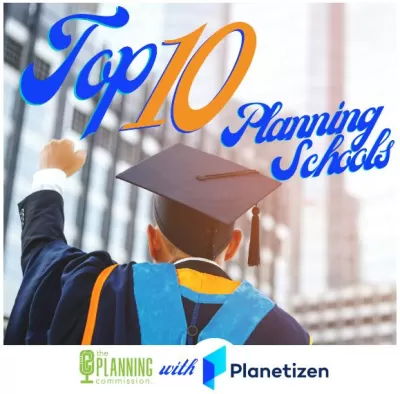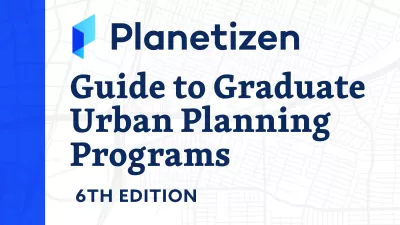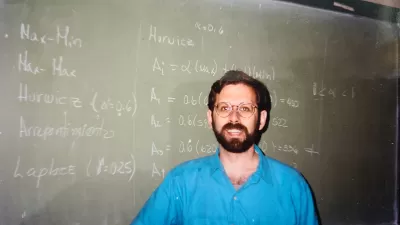Planetizen’s Editorial Director James Brasuell joins the Planning Commission Podcast to discuss their new list of the Top 10 Schools for Urban Planners.

Planetizen’s release of its Guide to Graduate Urban Planning Programs always creates a buzz for planners—both prospective students and alumni. The 7th edition was released in June 2023 and Planetizen’s Editorial Director James Brasuell joined The Planning Commission Podcast for the last episode of Season 2 to discuss what goes into the rankings and discuss the top 10 schools.
UCLA took the top spot for the first time in the history of the rankings, followed by MIT, Rutgers, Cal-Berkeley, and UNC-Chapel Hill. In the podcast episode, Brasuell outlines some of the notable features of these programs and others in the top 10 list while Commissioner Kostelec peppers in obscure tidbits about each school.
On UCLA taking the top spot, Brasuell says it’s due to a diversity of opinions among the faculty as well as substantial resources dedicated to the school’s planning program.
“You have some faculty that disagree on some of the fundamental issues of planning, like the effects of zoning,” said Brasuell. “UCLA has been killing it on fundraising. They’ve been attracting large donations and that’s one of the reasons they have these resources.”
The school’s location within Los Angeles and the greater Southern California region also benefits its students. “L.A. is an interesting place to study planning because we are working so hard to overcome some of the mistakes we made in the last century and exported around the world,” Brasuell noted.
To generate these rankings, Planetizen surveyed previous purchasers of the 400-page guide and asked them what they thought were important features of a planning program. Brasuell said post-graduate employment is the top concern. “People very much want to know they are going to be secure and stable when they make that investment,” he said.
Even if you feel your school of choice gets no respect, “the overriding message of what makes a good planning program is that the fit is different for every student,” said Brasuell. “These programs really tailor to different kinds of personalities.”
Brasuell notes that many schools have grown their online curriculum options, which was occurring prior to 2020, programs have largely settled back into their routines since the COVID-19 pandemic. “Overall, more schools are promoting the ability to study at night and tailor course load to someone’s professional career,” he said.
The more noticeable trend is graduate programs evolving their approach to incorporate topics like environmental risk and resilience, social justice, and experiential learning. “More programs are selling curriculum through a ‘learn by doing’ format that puts students in the community and allows them to learn from the community,” said Brasuell.
Planetizen's goals for publishing the Guide, which is updated semi-annually and available for purchase, is to grow the field of planning by helping the right students find the right graduate programs.
The Planning Commission is a spirited debate by planners, for planners. This independent outlet for all things planning explores the serious and lighter sides of the profession, poses probing and creative questions to guests, and always pairs the episode guest and topic with a choice libation. Listen to the podcast for a special offer from Planetizen.
FULL STORY: The Planning Commission Podcast - Season 2, Episode 20; or find it on your favorite podcast app!

Study: Maui’s Plan to Convert Vacation Rentals to Long-Term Housing Could Cause Nearly $1 Billion Economic Loss
The plan would reduce visitor accommodation by 25,% resulting in 1,900 jobs lost.

North Texas Transit Leaders Tout Benefits of TOD for Growing Region
At a summit focused on transit-oriented development, policymakers discussed how North Texas’ expanded light rail system can serve as a tool for economic growth.

Using Old Oil and Gas Wells for Green Energy Storage
Penn State researchers have found that repurposing abandoned oil and gas wells for geothermal-assisted compressed-air energy storage can boost efficiency, reduce environmental risks, and support clean energy and job transitions.

Private Donations Propel Early Restoration of Palisades Playground
Los Angeles has secured over $1.3 million in private funding to restore the Pacific Palisades playground months ahead of schedule, creating a modern, accessible space that supports community healing after recent wildfires.

From Blight to Benefit: Early Results From California’s Equitable Cleanup Program
The Equitable Community Revitalization Grant (ECRG) program is reshaping brownfield redevelopment by prioritizing projects in low-income and environmental justice communities, emphasizing equity, transparency, and community benefits.

Planting Relief: Tackling Las Vegas Heat One Tree at a Time
Nevada Plants, a Las Vegas-based nonprofit, is combating the city’s extreme urban heat by giving away trees to residents in underserved neighborhoods, promoting shade, sustainability, and community health.
Urban Design for Planners 1: Software Tools
This six-course series explores essential urban design concepts using open source software and equips planners with the tools they need to participate fully in the urban design process.
Planning for Universal Design
Learn the tools for implementing Universal Design in planning regulations.
Ascent Environmental
Borough of Carlisle
Institute for Housing and Urban Development Studies (IHS)
City of Grandview
Harvard GSD Executive Education
Toledo-Lucas County Plan Commissions
Salt Lake City
NYU Wagner Graduate School of Public Service





























